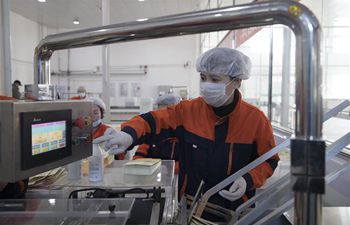WASHINGTON, Feb. 6 (Xinhua) -- A clinical trial in the United States showed that genetically-edited immune cells can thrive and function multiple months after cancer patients receive them.
This is the first U.S. clinical trial to test the gene editing approach in humans, according to a study published on Thursday in the journal Science.
Those cells are confirmed to be successfully edited in three specific ways, marking the first-ever sanctioned investigational use of multiple edits to the human genome, according to the study.
Scientists from the University of Pennsylvania used the popular gene-editing tool called CRISPR/Cas9 to edit three cancer patients' immune cells before bringing them back into the patients' bodies.
"We can successfully perform multiple edits with precision during manufacturing, with the resulting cells surviving longer in the human body than any previously published data have shown," said the study's senior author Carl June at the University of Pennsylvania.
Previously published data showed those cells typically survived for less than a week, but this new analysis showed the edited cells in this study persisted, with the longest follow up at nine months.
While none of three patients responded to the therapy, there were no treatment-related serious adverse events.
But this is the first confirmation of the ability of CRISPR/Cas9 technology to target multiple genes at the same time in humans and illustrates the potential of this technology to treat many diseases that were previously not able to be treated or cured, according to June.
Several months after the infusion, researchers drew blood from the patients and isolated the genetically-edited cells. It turned out that those cells were still able to kill tumors in the lab setting.
The approach used in this study is closely related to FDA-approved CAR T cell therapy, in which patient immune cells are engineered to fight cancer, but it has some key differences, according to the study.
Just like CAR T, researchers in this study began by collecting a patient's T cells from blood. But instead of arming those cells with a receptor against a protein such as CD19, the team used CRISPR/Cas9 to remove three genes, allowing T cells to seek out and destroy tumors.
Researchers said the new data may open the door to later stage studies to investigate and extend this approach to a broader field beyond cancer.













